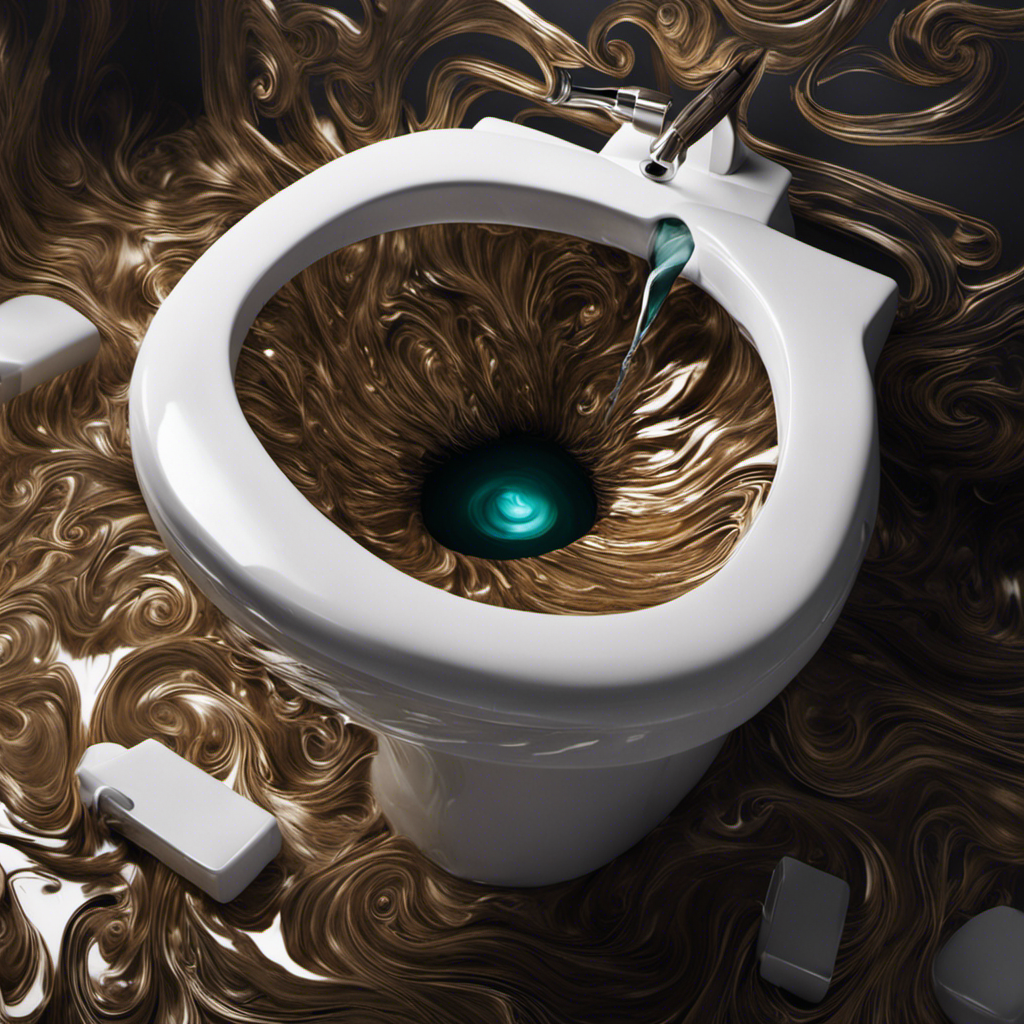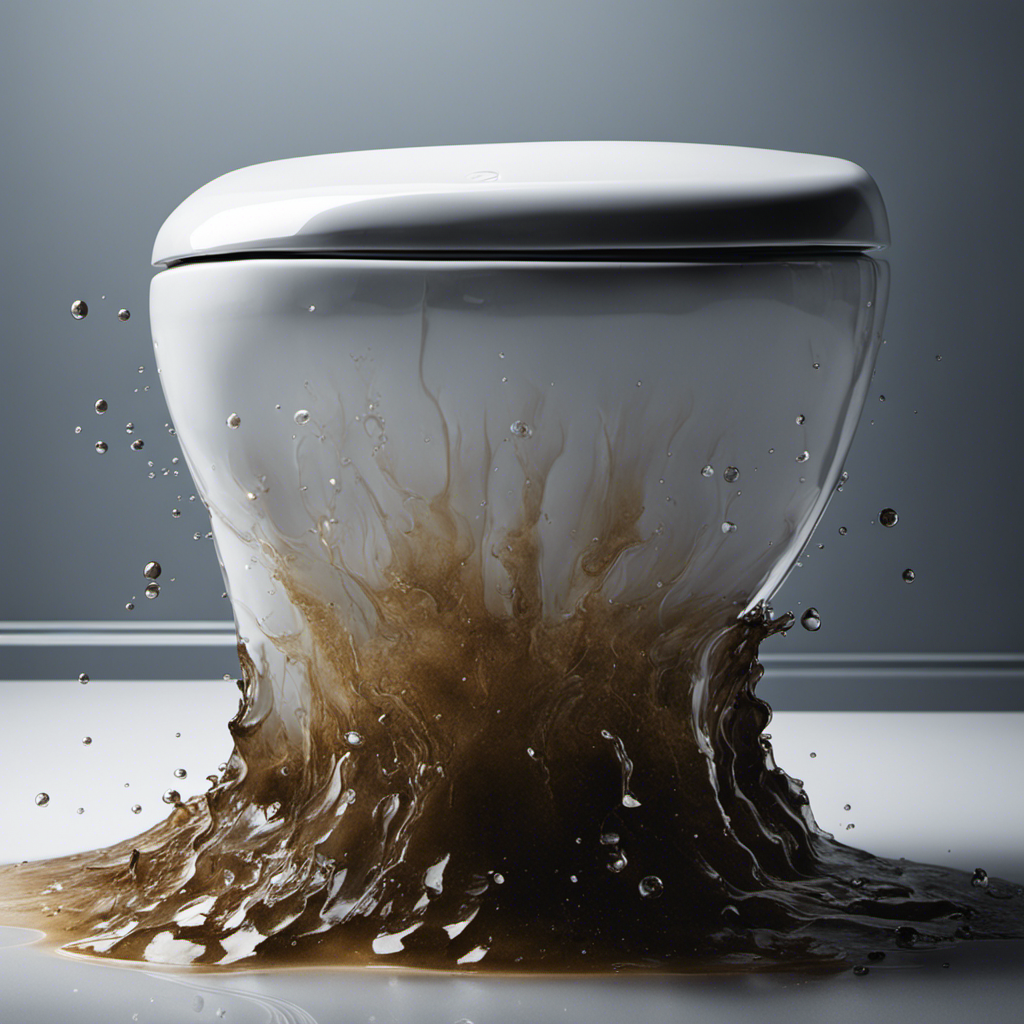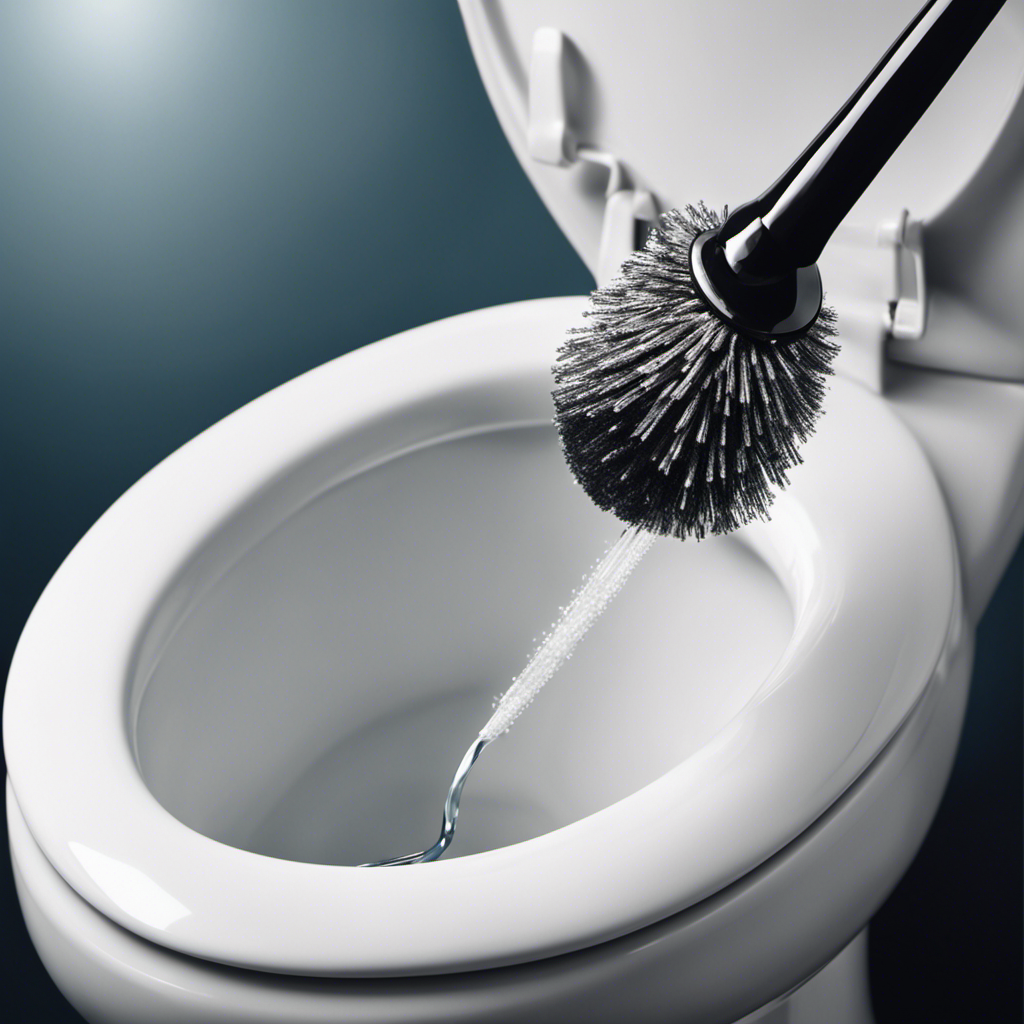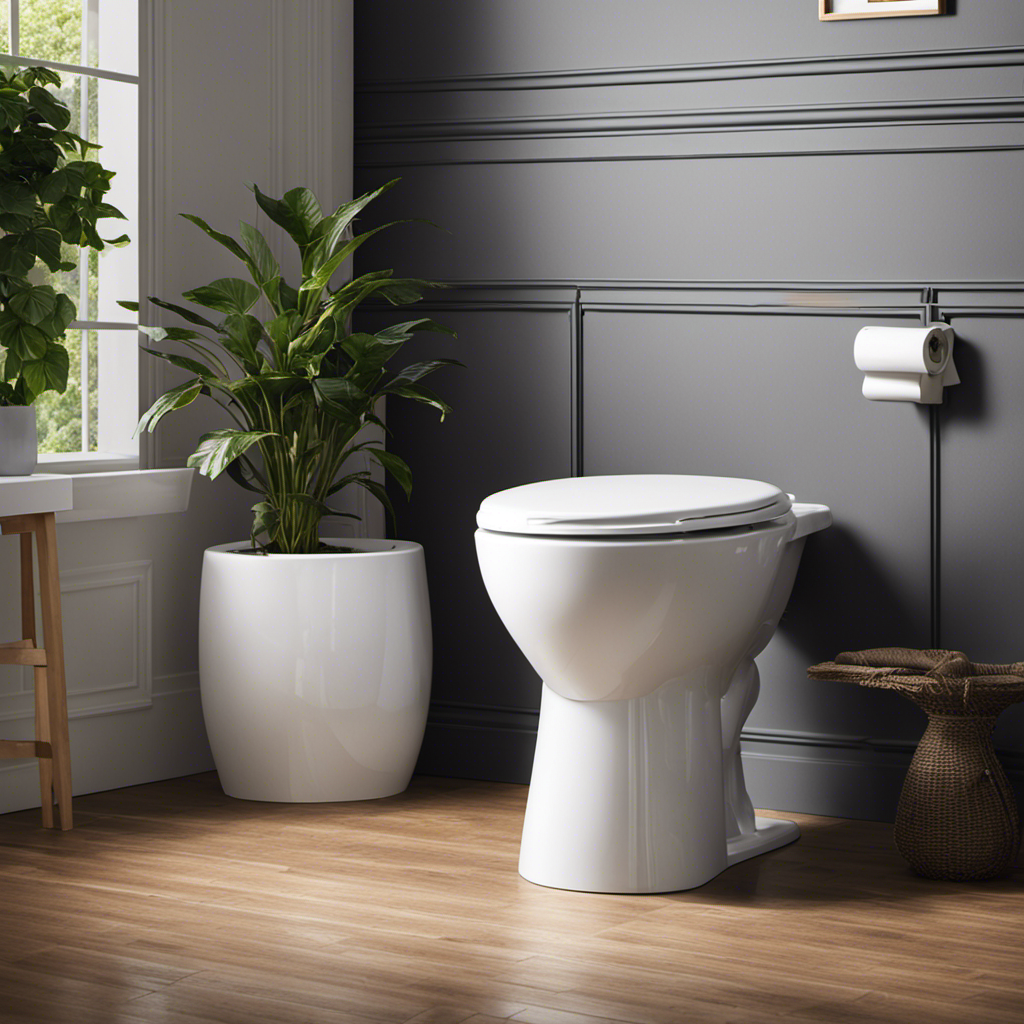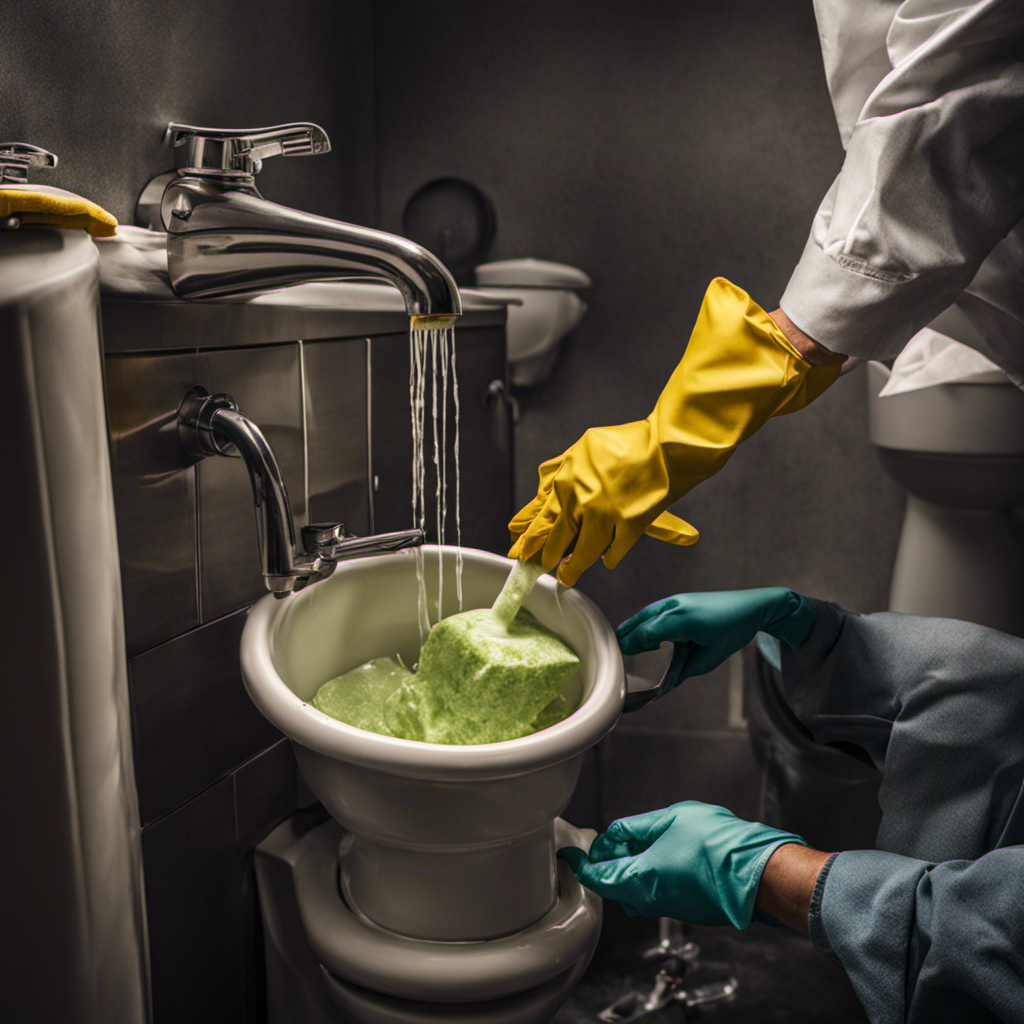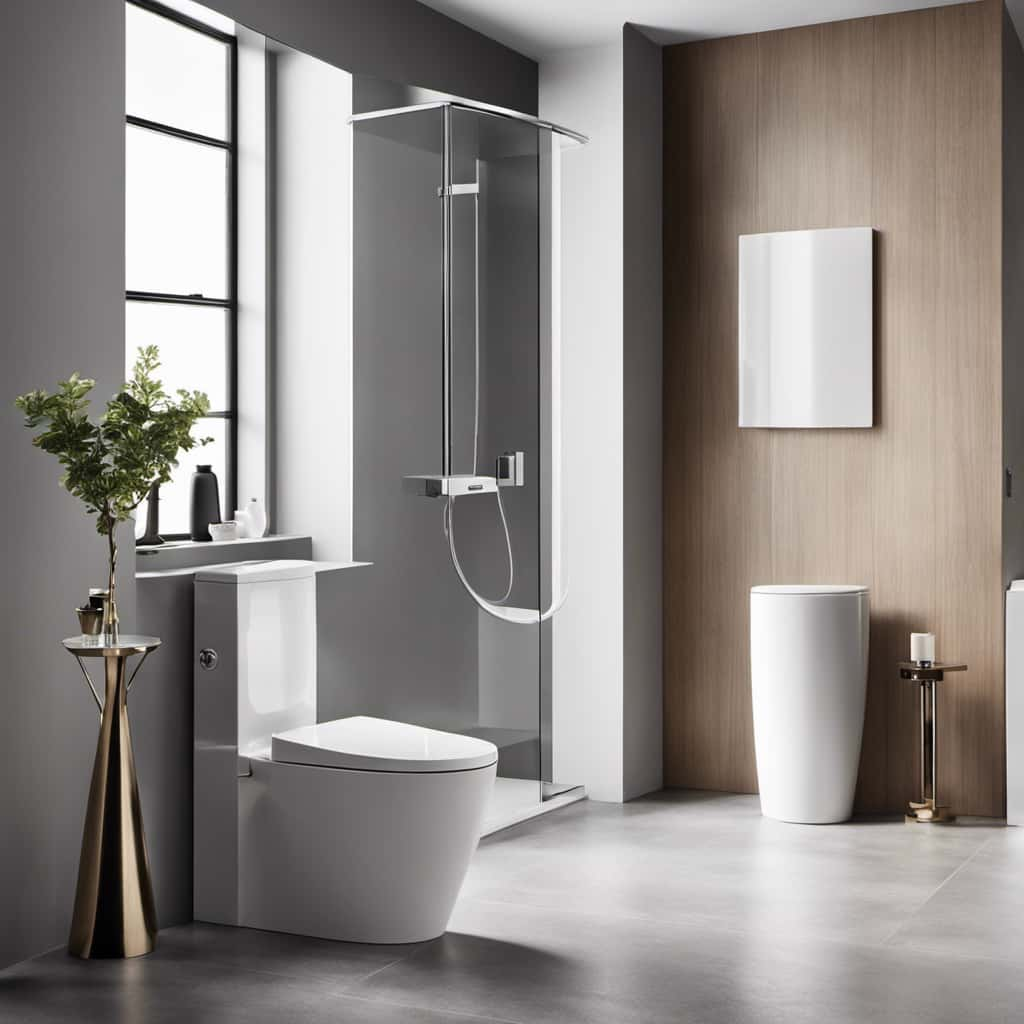I’ve figured it out – that annoying gurgling sound your toilet makes when flushed is not just a random quirk. It’s actually a sign of a bigger plumbing issue that needs attention.
In this article, we’ll dive into the common causes of toilet gurgling. We’ll also discuss how to identify a plumbing vent issue, steps to unclog the toilet drain, dealing with a partially blocked sewer line, and understanding the impact of water pressure on toilet gurgling.
Don’t worry, I’ll also let you know when it’s time to call a professional plumber for help.
Let’s get started!
Key Takeaways
- Clogged drain pipes or blockages in the plumbing system can cause toilet gurgling when flushed.
- Plumbing vent issues, such as obstructions or damage, can also lead to gurgling sounds.
- Partially blocked sewer lines should be addressed promptly to prevent further damage.
- Fluctuations in water pressure can contribute to toilet gurgling, and proper water pressure management is important for the efficient functioning of the plumbing system.
Common Causes of Toilet Gurgling
One of the common causes of toilet gurgling is a clogged drain pipe. When the drain pipe becomes blocked, it restricts the flow of water and air, causing the toilet to make gurgling sounds. This can happen due to various reasons, such as the accumulation of debris, foreign objects, or even tree roots infiltrating the pipes.
Troubleshooting toilet gurgling requires identifying the root cause and taking appropriate action. To determine if a clogged drain pipe is causing the gurgling, it is important to check for other signs like slow draining or water backing up into the bathtub or sinks. If a clog is suspected, using a plunger or a drain snake may help in clearing the blockage.
However, if the issue persists, it is advisable to seek professional assistance to prevent further damage to the plumbing system.
How to Identify a Plumbing Vent Issue
I’ve encountered many plumbing issues in my years of experience, but there are a few key symptoms that often point to a plumbing vent issue.
If you’re hearing strange gurgling noises coming from your drains, noticing slow draining water, or even detecting a sewer odor inside your home, it’s likely that there’s a problem with your plumbing vent system.
These signs indicate that there may be a blockage or malfunction in the vent, which can cause improper air flow and lead to a variety of issues in your plumbing system.
Strange Gurgling Noises
When a toilet gurgles after being flushed, it could indicate a potential plumbing issue. As a plumbing professional, I have encountered numerous instances where gurgling sounds have been a cause for concern. Troubleshooting these noises requires a thorough understanding of the plumbing system and its components.
One possible cause of gurgling sounds is a blocked or malfunctioning plumbing vent. The plumbing vent serves to equalize pressure within the system, allowing for efficient drainage. To inspect the plumbing vent, I would start by visually inspecting the vent pipe on the roof for any obstructions or damage. Additionally, I would check for any signs of debris or animal nests that may be obstructing the vent.
Slow Draining Water
If water is draining slowly, it could indicate a potential plumbing issue. Slow draining water is a common problem that can lead to other issues, such as toilet overflow. To understand the potential causes and solutions, let’s take a closer look at the factors that can contribute to slow draining water.
| Potential Causes | Possible Solutions |
|---|---|
| Clogged pipes | Use a plumber’s snake to remove the blockage |
| Improper venting | Check and clean the vent pipes |
| Faulty plumbing fixtures | Replace or repair the fixtures |
| Septic system issues | Inspect and maintain the septic system regularly |
Sewer Odor Inside
Sewer odor inside the house can be a sign of a potential plumbing issue. If you detect a foul smell that resembles sewer gas, it’s important to address the problem promptly.
Here are a few key indicators to look out for:
-
Strong, unpleasant smell: A pungent odor that resembles rotten eggs may indicate the presence of sewer gas in your home.
-
Toilet venting issues: Improperly vented plumbing systems can lead to sewer odors seeping into your living space.
-
Gurgling sounds: If you hear gurgling noises coming from your toilet when it’s flushed, it could be a sign of a blocked vent or drain.
Identifying the source of the odor and resolving the underlying plumbing issue is crucial to restore a healthy and odor-free environment.
Now, let’s move on to the subsequent section and discuss the steps to unclog the toilet drain.
Steps to Unclog the Toilet Drain
To unclog the toilet drain, you should first try using a plunger. This is one of the most effective unclogging techniques and can be easily done as a DIY solution.
Start by ensuring there is enough water in the bowl to cover the plunger’s cup. Place the plunger firmly over the drain hole and push down gently, creating a seal. Then, rapidly push and pull the plunger to create suction and pressure, which can dislodge the clog. Repeat this motion several times until the water starts draining properly.
If the plunger doesn’t work, you can try using a toilet auger or a drain snake for more stubborn clogs.
Remember to always follow safety precautions and avoid using chemical drain cleaners, as they can damage the pipes and harm the environment.
Dealing With a Partially Blocked Sewer Line
When it comes to sewer line maintenance, it’s essential to address any issues promptly to prevent further damage and costly repairs. Dealing with a partially blocked sewer line requires a systematic approach to identify the cause and apply the appropriate DIY unclogging methods. Here are three key steps to consider:
-
Conduct a visual inspection: Start by visually examining the sewer line to check for any visible clogs or blockages. Look for signs of tree root intrusion, debris buildup, or collapsed pipes.
-
Use a plumbing snake: A plumbing snake, also known as an auger, can be an effective tool for clearing minor blockages. Insert the snake into the sewer line and rotate it while applying gentle pressure to break up the clog.
-
Flush with hot water and vinegar: Pour a mixture of hot water and vinegar down the drain to dissolve any grease or organic matter that may be causing the partial blockage.
Understanding the Impact of Water Pressure on Toilet Gurgling
If you’re experiencing a fluctuation in water pressure, it could be causing an unusual noise in your plumbing system. Understanding the impact of water pressure on toilet gurgling is crucial for effective troubleshooting.
The water pressure management plays a significant role in maintaining the proper functioning of your plumbing system. When the water pressure is too high or too low, it can create issues such as toilet gurgling.
High water pressure can cause the water to rush through the pipes quickly, resulting in air being forced into the toilet bowl, leading to gurgling sounds. On the other hand, low water pressure can cause improper flushing, leading to gurgling noises.
To troubleshoot toilet gurgling, it is essential to check and adjust the water pressure to the recommended levels. This can be achieved by installing a pressure regulator or consulting a professional plumber.
When to Call a Professional Plumber for Toilet Gurgling
If you’re experiencing persistent gurgling sounds in your plumbing system, it may be time to call a professional plumber. While some toilet gurgles can be fixed at home, certain signs indicate a more serious issue that requires professional attention.
Here are some reasons why calling a plumber is necessary:
-
Damaged Toilet Flapper: A damaged or worn-out toilet flapper can cause gurgling sounds when flushed. This component is responsible for controlling the water flow in the toilet tank. If it is not functioning properly, it can lead to gurgling noises and even water leaks.
-
Complex Plumbing System: If you have tried basic troubleshooting methods at home and the gurgling persists, it could indicate a more complex problem within your plumbing system. A professional plumber has the knowledge and expertise to diagnose and resolve issues that may be causing the gurgling sounds.
-
Prevent Further Damage: Ignoring persistent gurgling sounds can lead to more significant plumbing problems down the line. By calling a professional plumber, you can prevent potential damage to your plumbing system and avoid costly repairs in the future.
While it’s always helpful to try fixing minor issues at home, it’s crucial to recognize when it’s time to seek professional assistance for toilet gurgling problems.
Frequently Asked Questions
How Much Does It Cost to Fix a Toilet Gurgling Issue?
When a toilet gurgles, it could be due to various causes such as a clogged vent pipe or a faulty fill valve. The cost of fixing it depends on the specific issue and the plumber’s rates.
Can a Toilet Gurgling Problem Be Fixed Without Calling a Plumber?
Yes, a toilet gurgling problem can often be fixed without calling a plumber. There are various unclogging methods that can address common causes such as blockages in the pipes or vent stack.
What Are the Signs of a Sewer Line Blockage?
When it comes to signs of a clogged sewer line, there are a few key indicators to watch for. Slow drains, foul odors, and gurgling noises are common. Blockages can be caused by tree roots, debris, or collapsed pipes.
Can a Toilet Gurgling Problem Be a Sign of a More Serious Plumbing Issue?
Yes, a toilet gurgling problem can indicate a more serious plumbing issue. It could be caused by a sewer line blockage or venting problems. Regular maintenance and proper disposal of waste can help prevent toilet gurgling.
How Long Does It Typically Take to Unclog a Toilet Drain?
Typically, unclogging a toilet drain can take anywhere from a few minutes to a couple of hours, depending on the severity of the blockage. Common causes include excessive toilet paper and foreign objects. Various unclogging methods can be used, such as using a plunger or a toilet auger.
Conclusion
In conclusion, it is crucial to address the unsettling sound of a gurgling toilet promptly. By identifying common causes, such as plumbing vent issues or clogged drains, and following the necessary steps to unclog the toilet, one can eliminate this annoyance.
However, if faced with a partially blocked sewer line or inconsistent water pressure, it is wise to seek the expertise of a professional plumber. A gurgling toilet is not just a mere inconvenience, but a sign of deeper plumbing problems that need immediate attention.
Think of it like a ticking time bomb waiting to disrupt your peace.
